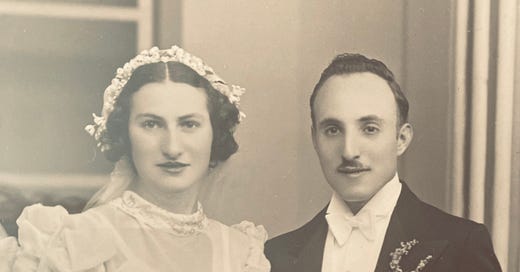This Friday is D-Day, marking the 80th anniversary of the Normandy landings, an occasion that will no doubt be made more poignant by the fact that it’s likely to be the last major commemoration attended by those who served.
My mum’s dad and my grandpa, Jack Marcus, who I didn’t know because he died so young, served as an ambulance driver in France. The only story I know of his time in the field was that he enlisted at just 22-years-old and saw his friends, who were driving another ambulance in front of him, blown up and killed.
I can’t imagine what that might do to your mind but by all accounts he returned home a changed man. It wasn’t spoken of back then but he almost certainly was suffering from PTSD, which had a trickle down effect on his family. Those who served on the frontlines back then were not encouraged to discuss what they say and most of them didn’t want to.
Jack was an American, married to my grandma Hannah, a Brit. I’m told he gave up his US citizenship to become a UK citizen in order to serve in the British army. I don’t have much more to share other than this evocative photograph of the couple on their wedding day.
Mum remembers a remote, troubled man, who didn’t laugh much, if at all. He was diagnosed with cancer when he was 39-years-old and died a couple of excruciating years later. In every way, I find his story both courageous and desperately sad.
By the time I came along my grandma had remarried a man called Nat, who I remember as funny and kind. When we’d walk by the station near our house, he would name the trains. One of them was called Fred. Sadly, I don’t remember much more because I was only eight-years-old when he passed away.
The stories from our ancestors become less easy to tell because those who were there to tell them firsthand are no longer with us. Thank goodness we have historians and biographers. It’s so important that we document all the terrifying, painful and heroic details, especially looking at the state of the world as it is right now.
Interestingly, it seems as if more stories that feature the work of women during those war years are coming to light, and a current exhibition at the International Bomber Command Centre, in Lincoln, is honouring ten who played pivotal roles.
“Women in War” which opened in March, features steel silhouettes commemorating, among others, physicist Joan Curran, who contributed to the development of a radar that disrupted German detection systems, Dorothy Robson (below), a physicist and engineer responsible for developing tools for precision bombing (she tragically died at 23 during a test mission), and Lettice Curtis, who was the first woman to fly and deliver operations in a Lancaster bomber.
This weekend, I’m going to be posting a Ten for The TEN interview with historian and author Hanna Diamond, who has just published a book called Josephine Baker’s Secret War, telling the story of the entertainer’s double life as a spy.
Baker, seen below, was an iconic figure of the 20th century - a singer and dancer but also a creative genius whose life story transcends the boundaries of art. Her journey from an impoverished childhood in St Louis, to becoming a celebrated performer in Paris, is a testament to her unique voice, tenacity and unyielding spirit.
Her life took a remarkable turn during WWII when she became a spy for the French Resistance. Using her fame and connections, she gathered intelligence that was vital to the war effort.
Her story, like so many others, endures. You can strip out museums, wipe information from websites and bomb people into oblivion but you can’t delete history.
Pen, paper and a willingness to share the details means that the contributions from those who fought for our freedoms can be acknowledged, and I’m sure there are many more stories left to reveal.
They don’t often have a happy ending. Grandpa Jack’s story truly saddens me. He went through so much to die so young. But today, because of this post you can look at his photograph, and remember him and his friends, who served together in the British Army, driving ambulances through war torn France. They were a group of young men, who saw horrors that stayed with them til their last days.
I may not have known Jack, and I may be two generations younger, but that’s not to say he has been forgotten.
Lisa
Several charities are involved in remembering and supporting D-Day veterans. These include The Spirit of Normandy Trust which organises pilgrimages to Normandy, and SSAFA, the Armed Forces charity, which runs fundraising events. The Royal British Legion also organises remembrance events, and the British Red Cross also provides support for veterans.








I've always thought the seasons taking place during and around WWI on Downton Abbey did a solid job of portraying both the symptoms and the stigma surrounding PTSD, or shell shock as it was called, during that time. I can't imagine what your grandfather went through.
Thanks for sharing your grandpa Jack’s story, Lisa. What a hard life he had, and as you say, it has a knock on effect for the generations following.
The Lincoln exhibition sounds fascinating.